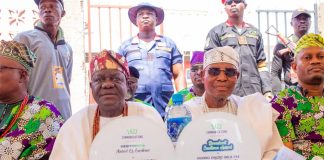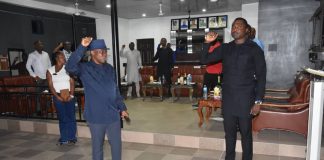

The Lagos State Government has promised to sustain the Agro-Processing, Productivity Enhancement & Livelihood Improvement Support (APPEALS) Project in the state for its continuous development despite the completion of the partnership with the World Bank.
Lagos State Deputy Governor, Dr. Obafemi Hamzat gave this assurance yesterday during a courtesy visit to him by the delegations of the World Bank, Federal Ministry of Finance, Federal Ministry of Agriculture & Rural Development and National Coordination Unit of APPEALS Project at the Official Residence of the Deputy Governor, Osborne Ikoyi.
Dr. Hamzat noted that “the APPEALS Project has been very successful in the state, over 10,000 people have benefited across different levels; farming, fishing, food processing and amongst other, and all these have led to the realignment of markets and other values have been benefited in the state”.
He added that “though the project is coming to an end, the state government will sustain it, we are here to discuss the exit plan and hence the state will now find a way to keep it up, sustain the legacy, to make sure that beneficiaries don’t face off and how to push-in new beneficiaries into it”
According to Dr. Hamzat, the APPEALS project was carried out in six different states, namely; Lagos, Enugu, Cross River, Kano, Kaduna and Kogi states, noting that the programme was very successful and beneficial to the state.
The Deputy Governor was of the view that the collaboration has improved the processing capability and agriculture credentials of the state and the country. He stated that the turnage per production for rice has increased from 1.5 to 2.5 tons, so also for the local rice Ofada, likewise, the turnage gotten per hectare of land has increased.
He added that the project will be sustained by the State, thereafter as it was in partnership with World Bank, and sustaining the APPEALS project will help Lagos to get in line with the happenings around the world.
The Lagos State Project Coordinator for APPEALS, Mrs. Oluranti Sagoe stated that the project had five components in the state; productivity of farmers with three value chains poultry, aquaculture, and rice; Support for Women and Youths; Infrastructure amongst other components
According to Sagoe, in the poultry sector, the farmers in the state have been supported, the productivity for broiler production of farmers has increased from 1.8 to 2.5 in six weeks and such growth has been recorded in the production of eggs. Adding that the state has successfully adopted egg powder technology.
Besides, she said the development recorded in the state through the project, especially in the Aquaculture sector, include the Tilapia Fish encaged culture which has been promoted and concentrated on two water bodies in Afowo and Epe area of Lagos State. She reiterated that over one hundred and eighty cages have been built on the two waterways.
She also added that the project was targeted to support 700 women and youth initially but at the completion, the target was exceeded to 1,786 women and youths. According, “capacities have been built through the support gotten from the Lagos State Government. Out of which 1,738 of the beneficiaries have been supported with inputs that have made them gainfully employed and have also made them employers of labour presently”.
Similarly, the Enugu State Project Coordinator for APPEALS, Mrs. Eze Ihuoma stated that the project has been very impactful in the state, jobs have been created for women and youths and the livelihoods of farmers have been improved through technology and inputs which has improved agricultural production generally.
She added that “the project is already transforming agriculture in the state, the APPEALS project is very satisfactory across the state, from the feedback we are having, it has been a lot of success”.
In his remarks, the Task Team Leader of the APPEALS Project from the World Bank, Dr. Manievel Sene, stated that the project was designed to increase the productivity and processing of farmers in some selective states to ensure food security in the country.
He noted that in the course of the project, a lot of training, capacity-building technology dissemination and adoption for investment has been achieved. Speaking on the implementation of the key activities, Dr. Sene stated that “we have key elements that show what has been done in the different states and these include clear strategies in place for scaling up, taking ownership by the states and exit plans after APPEALS Scores which is very important for World Bank”.














